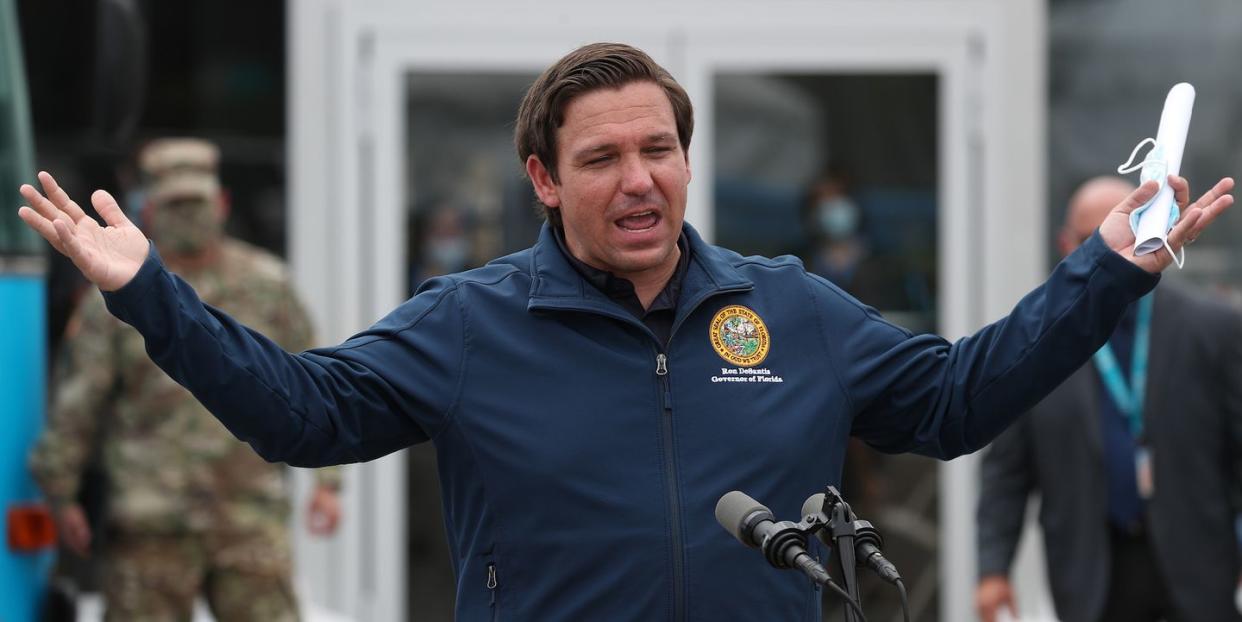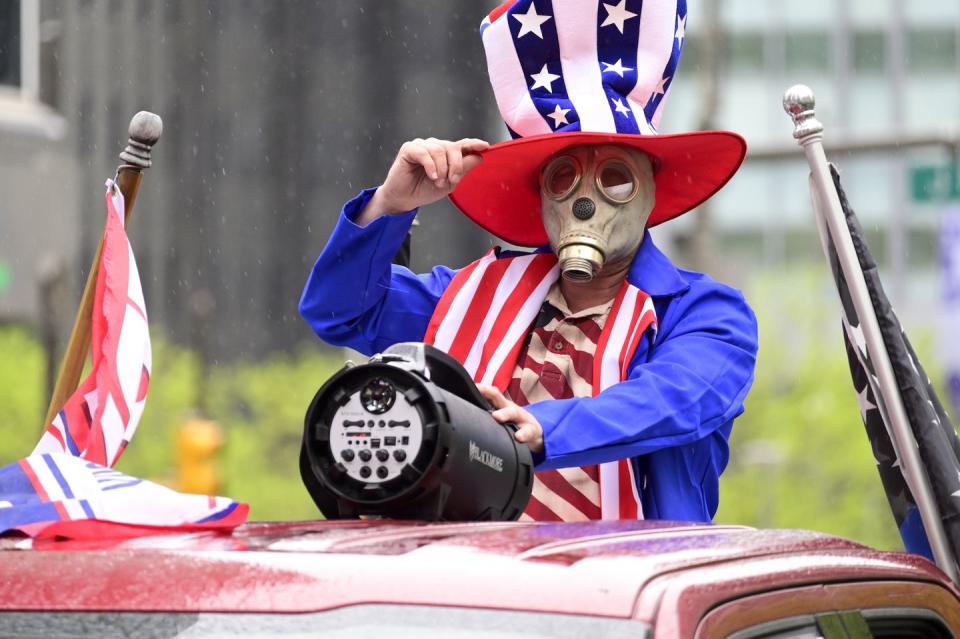God, I Hope the 'Reopen Now' Brigade Is Right. The Alternative Could Be Horrific.

I hope they're right. I really do. States and localities across the United States are now reopening in earnest, even if in some cases there's no data to suggest the danger they face related to the COVID-19 pandemic is truly in decline. In the U.S., 85,000 people are dead so far, and we're now hearing about a projected 120,000 fatalities in this war where the country has mobilized behind a common goal—and very admirably so—for about two months. This nation has 4.2 percent of the world's population, but 28 percent of the world's coronavirus deaths. That would seem to indicate we are doing a particularly bad job already, and now we're talking about lifting the only measure—quarantine—that public-health experts believe has really made a dent in the problem.
Even before I tested positive for COVID-19 antibodies, I was sure I'd had a bout with the disease at the center of the worldwide pandemic that has disrupted all our lives: head and body aches, fatigue and chills, a bit of a dry cough, and of course, losing my sense of smell. It was a mild bout, but it seemed clear it was an encounter with the coronavirus, particularly because I was holed up in New York City, the epicenter. Now, although the World Health Organization has yet to publicly settle on whether there is an immunity period for those who have antibodies, I can be reasonably confident that I cannot currently contract the disease again. As a result, I would personally feel comfortable going to a concert right now.
Yet I will not go to a concert, or much of anywhere, because the stay-at-home order remains in effect for my area of New York State. Other regions of this state's sprawling geographic area are beginning to reopen, and maybe that's the right thing to do right now. New York has a pretty robust testing regime at this point, and has started development of a tracing program, where a corps of people, recently hired, are tasked with tracing the footsteps of anyone who tests positive and informing those whom they might have come in contact with that they could be sick. This is what other nations have done with strong results, along with policies like centralized quarantine to prevent the disease from spreading within the home. But how many of the states and localities now reopening have this infrastructure in place? How many of these governors and mayors and county administrators truly know where the disease is within their jurisdiction?
My view is colored by my experience here in the epicenter, of course, where a portal to hell seemed to open up sometime in March and has only recently started to close. (Really, it appears to have opened in February, or even January. That's the insidious nature of this disease: it creeps in and spreads itself about before it makes itself known.) You will not find many lockdown protesters around here, even though so many New Yorkers have lost their jobs and their incomes. We have seen the darkness. We have seen what this vicious and horrible thing is capable of. I hope no other city or county or state in this country is unfortunate enough to share our experience. I hope they are right that this is a big-city disease, a plague that struck the capital of the world so hard because we are—or were—packed together on crowded subways with travelers from all over the planet. There are already signs, however, that the virus is not afraid to venture into the less populated places.

But I hope they are right. I hope this all can be managed with sheer American spirit, with rugged individualism, all under the widely held philosophy that the government telling you to do anything constitutes tyranny. One protester in Tennessee suggested lockdowns are "slavery" because she's a "Type-A lawyer" who's "bouncing off the walls" of her living room. I would humbly suggest that you do not bring that noise to Elmhurst. After all, it was the areas where the poor and disenfranchised live in New York City that were hit the hardest. These are some of the "essential workers," people who cannot work from home and cannot afford not to work, even for a week. They're often paid hourly and too little, and they might have been working paycheck-to-paycheck even before this cataclysm struck the world. They do not have the luxury of bouncing off the walls between Zoom calls. They are not white lawyers who are bored. And it's them, disproportionately, who are dying.
That dynamic is unlikely to change elsewhere in the country. It raises the prospect that some of the people fighting hardest to reopen the country immediately—white people with money—will not bear the brunt of the consequences. Perhaps, even subconsciously, they know that. After all, many of these people with the signs comparing governors to Hitler for doing what leaders in countries all over the world have done—and in fact, imposing a less stringent version for the most part—talk about their desire to get a haircut, not open their salons back up. Surely barbers themselves want to reopen, too, and some have, but they're the ones who will have to sit inside all day interacting with a rotating cast of strangers who may be carrying the disease. Moral hazard is also an epidemic in this country.
But we're locked into the culture war now. Even a pandemic could not avoid the gravitational pull. There is now a right-wing rebellion against wearing masks to match the rebellion against stay-at-home orders, the latter of which, again, is not a particularly stringent version of "lockdown." As a New York Times health reporter said on CNN this week, he could drive across the country to another city right now while infected if he wanted to. This is not what things looked like in Italy.
We have been forced into a false choice between "forever lockdown"—which no one advocates—and "open immediately"—which we don't have the testing infrastructure to do everywhere safely. There's a creeping suspicion this framing suits those who are radically opposed to the government providing assistance to people while the economy is shuttered, which is of course another option: rather than risk reopening too early, the feds could keep spending money—in extremely favorable borrowing conditions—to keep people afloat in the meantime. This is also a framing preferred by the president, who is not interested in anyone asking why we have not developed the requisite testing infrastructure. He burned the month of February saying the virus would just go away, then he burned two more months while we all sat in lockdown, "bouncing off the walls." We still don't have enough testing. His administration has now reportedly turned its attention to fudging the numbers. We cannot begin to reopen safely now, as many countries are, because of his incompetence.

But admitting that is more painful for some than making the argument that some old people are just going to have to die. That's a growing sentiment, particularly on the right, even among some who consider themselves Pro-Life. Some are turning to folk science about the quest for herd immunity, which actual scientists say is not a realistic solution. Some are leaning on theology, suggesting that because they personally believe in a glorious afterlife, we're all much too worried about death. In most countries, these sentiments would be considered something approaching public insanity. Europe has signaled they view us as a bit out there: as countries whose economies rely heavily on tourism begin to draw up plans to open up travel, they are not including Americans in their plans.
"The key to any successful reopening in Europe is based entirely on risk assessment," Barbie Latza Nadeau writes in The Daily Beast from Rome, "meaning anyone coming from a nation deemed risky or careless will be the first to be banned. Simply put, anyone who has been under the lax American approach to the pandemic, which has been the laughing stock of Europe, won’t be welcome any time soon."
But maybe they're all wrong, and America is right. We've certainly operated on that premise before. Maybe the disease that brought the whole world to its knees is no match for the United States, or at least those parts that have not already been decimated by it. (The coasts and the big cities might not be Real America, after all, but they are technically part of the country.) God, I hope so, because we're about to put all that to the test. And besides, I'm desperate for a haircut. But I'm not the one in danger. The people most at risk of bearing the consequences of all this by and large won't be making the decisions. I hope the governors and the lockdown skeptics and the president are right, because the horrors we risk otherwise are frankly biblical. I hope they're right, because if they're not, they will face the wrath of God and men.
You Might Also Like

